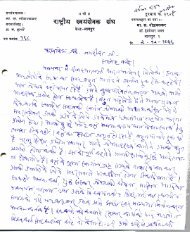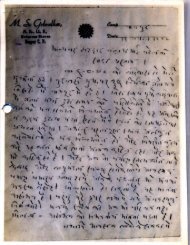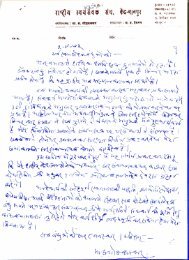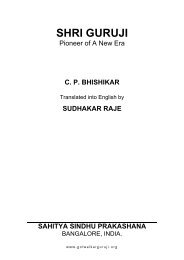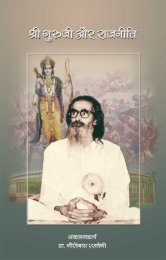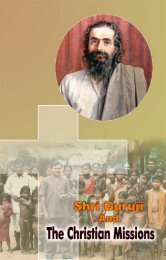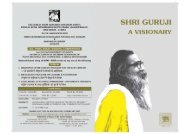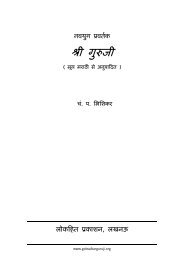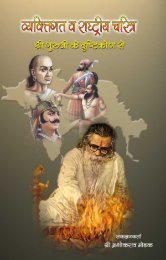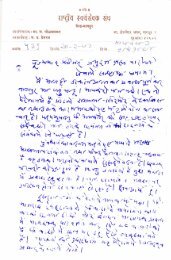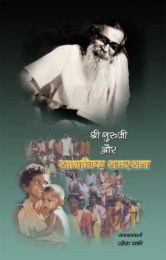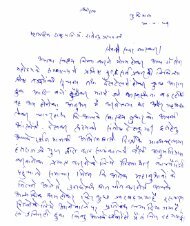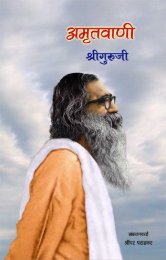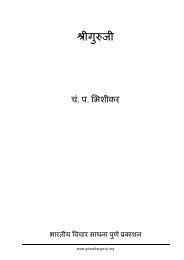Shri Guruji and Indian Muslim.pdf - Shri Golwalkar Guruji
Shri Guruji and Indian Muslim.pdf - Shri Golwalkar Guruji
Shri Guruji and Indian Muslim.pdf - Shri Golwalkar Guruji
You also want an ePaper? Increase the reach of your titles
YUMPU automatically turns print PDFs into web optimized ePapers that Google loves.
Chapter - II<br />
Aggressors <strong>and</strong> Converts<br />
The advent of Islam in India was not only an addition of a new religion in the Hindu<br />
civilisation but also the beginning of ceaseless social <strong>and</strong> religious confrontations. It<br />
repudiated age-old convention of religious freedom. Aggressors were conscious of inclusive<br />
nature of Hindu civilisation. Assimilative character of Hindu cultural environment was, in the<br />
eyes of <strong>Muslim</strong> elites a serious threat to <strong>Muslim</strong> way of life <strong>and</strong> called for ‘constant vigilance<br />
<strong>and</strong> effort’ to thwart it. (Madan1997: 112) 4<br />
<strong>Guruji</strong> points out,“Many persons came to this country from various parts of the world.<br />
They have chosen to stay here. They have adapted themselves to the life here, the ideology<br />
<strong>and</strong> philosophy here. Some have made their own contribution towards enriching this<br />
mainstream. The <strong>Muslim</strong>s unfortunately, stayed apart.”(<strong>Guruji</strong>: 1974:48)<br />
Thus a trail of two civilisations continued for more than thous<strong>and</strong> years. While one had<br />
the state power, organised force with a mission <strong>and</strong> a zeal to exp<strong>and</strong> Islam, another had<br />
‘highly developed civilisation, religious traditions which were radically different’ (Madan<br />
1997:145) extremely disorganised polity <strong>and</strong> divided social structure. There is no parallel of<br />
the heroic tales of the people who resisted religious onslaught<br />
4 Also see Qureshi, Ishtiaq Hussain, The <strong>Muslim</strong> Community of Indo Pakistan Subcontinent’ 1962, (610-<br />
1947), P.103<br />
From generations to generation <strong>and</strong> despite all the criminal <strong>and</strong> barbaric acts committed<br />
by the <strong>Muslim</strong>s, Hindu civilisation stood the test of time. Numbers of Hindus, who<br />
surrendered to Islam or forcibly converted, were far less than number of people killed by the<br />
aggressors. Sikh gurus faced persecutions to save the indigenous culture <strong>and</strong> traditions.<br />
<strong>Guruji</strong> draws a line between <strong>Muslim</strong> aggressors <strong>and</strong> the converts. Aggressors belonged to<br />
different race; nationality, civilisation <strong>and</strong> culture while the converted <strong>Muslim</strong>s have<br />
commonality with Hindus. They have common ancestors, common culture <strong>and</strong> history.<br />
<strong>Guruji</strong> follows more comprehensive criteria to define a Hindu. He says, “We are not so mean<br />
as to say that with a mere change in the method of worship an individual ceases to be a son of<br />
the soil. We have no objection to God being called by any name whatever …he can not be a<br />
Hindu at all who is intolerant of other faiths” (G 2000: 125) 5<br />
How can a body of converts claim separate culture or disassociate with their ancestors<br />
<strong>and</strong> delink themselves with the history <strong>and</strong> trajectory of the national life? <strong>Guruji</strong> feels that<br />
<strong>Indian</strong> <strong>Muslim</strong>s have been trying to compartmentalise all aspects of their life whether it may<br />
be language, culture, uniforms <strong>and</strong> festivals or national heroes. He says, “Why should they<br />
(<strong>Muslim</strong>s) behave as they are doing? As a matter of fact, in no other country in the world,<br />
where Islam has spread, the earlier dress, the language, the way of living etc., of those<br />
countries have changed. In Iran, Turkey <strong>and</strong> other countries their original dress, language,<br />
view of life etc., have remained the same. But in our country everything, even thinking also,<br />
is changed.”(<strong>Guruji</strong>, 1974:46)<br />
<strong>Shri</strong> <strong>Guruji</strong> begins with his theory that people of the l<strong>and</strong> irrespective of their religious<br />
beliefs belong to the same cultural <strong>and</strong> ancestral origin <strong>and</strong> says, “<strong>Muslim</strong>s must realise that<br />
we are all one people <strong>and</strong> it is the same blood that courses in our veins. They are not Arabs or<br />
Turks or



